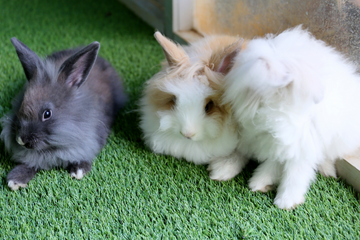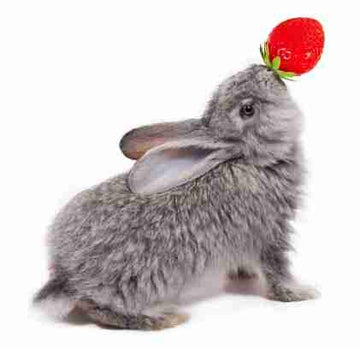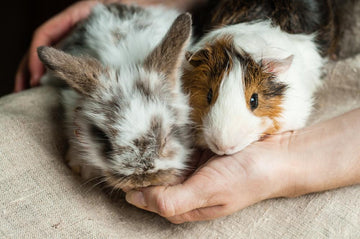Rabbit Diet Restrictions: Too Much of These 5 Foods Can Cause Issues
Rabbits bring joy to our lives with their playful antics and adorable nature, but their care requires thoughtful attention—especially when it comes to their diet. Understanding rabbit diet restrictions is crucial for ensuring their health and longevity. While hay forms the foundation of their daily nutrition, knowing which foods to limit is just as important.
Click Here For a Guide to Understanding Your Rabbits Diet.

Hay, particularly grass hay like Timothy Hay, should make up at least 80% of a rabbit's daily intake. It supports digestion, dental health, and natural foraging behaviors. But what about the other 20%? This article explores five common foods that, while tempting to feed in abundance, should be offered sparingly due to potential health risks.
Learn more about crafting the ideal diet for your rabbit with our comprehensive dietary guide.
To ensure you're feeding your rabbit the right amount, try our Adult Rabbit Food Calculator. It's a handy tool to determine the correct portion sizes based on your rabbit's weight and age.
1. Rabbit Diet Restrictions: Too Many Pellets
Pellets are a popular addition to a rabbit's diet, but overreliance on them can have unintended consequences. Too many pellets can lead to obesity, digestive issues, and reduced hay consumption, which is vital for overall health. When choosing pellets, prioritize high-quality options with a minimum of 18% fiber and avoid those containing fillers like cereal, seeds, and grains. These additives often carry unnecessary fats and salts.
Here's a guide to portioning pellets based on your rabbit's age and weight:
-
Juvenile rabbits (8 weeks - 7 months): Unlimited pellets to support rapid growth and development.
-
Young adults (7 months - 1 year): 1/2 cup of pellets daily per six pounds of body weight.
-
Mature rabbits (1 - 5 years): 1/4 cup of pellets daily per six pounds of body weight.
Remember, balance is key. Always ensure that hay remains the primary component of your rabbit's diet.
2. Lettuce
While lettuce is a healthy addition to your rabbit's meals, not all types are created equal. Dark leafy varieties, such as romaine, are rich in nutrients and promote digestion. In contrast, lighter lettuces like iceberg contain lactucarium, which can cause diarrhea and other gastrointestinal problems.

Introduce lettuce gradually into your rabbit's diet and monitor their reaction. Serve small amounts initially to ensure it doesn't upset their stomach. Keep in mind that vegetables should make up only about 10% of their overall diet.
3. Carrots
Despite their portrayal as a rabbit's favorite food in pop culture, carrots should be fed sparingly. Carrots are high in sugar, which can contribute to obesity and dental problems if consumed in large quantities. Consider them a treat rather than a staple, offering a small slice as an occasional reward.
As a general rule, prioritize fibrous vegetables and reserve sugary options like carrots for special occasions.
4. Fruit
Rabbits love sweet treats, and fruit often tops the list. However, fruits are high in sugar and should constitute no more than 10% of their diet. Safe options include melons, berries, and apples (without seeds or stems), but caution is necessary. Apple seeds contain cyanogenic glycosides, a substance toxic to rabbits. Always remove seeds and stems before serving.
For a detailed list of safe fruits, check out this resource.
5. Plants and Weeds
Outdoor playtime offers enrichment and exercise but also presents potential hazards. Many common plants and weeds found in gardens and lawns are toxic to rabbits. Some to avoid include tomato leaves, tulips, daffodils, and oleander. Thoroughly inspect your yard and remove any harmful plants before allowing your rabbit to roam freely.
For more information on toxic plants, refer to this comprehensive guide.
Balancing Rabbit Diet Restrictions with Nutritional Needs
Understanding rabbit diet restrictions ensures you're providing a balanced and safe diet. While indulging your rabbit with treats is tempting, moderation is essential to avoid long-term health problems. Focus on high-quality hay as the cornerstone of their nutrition and introduce other foods thoughtfully and sparingly.
If you're uncertain about a particular food, always consult your vet. Rabbits have sensitive digestive systems, and even seemingly harmless foods can have adverse effects. Staying informed about rabbit diet restrictions is the best way to keep your bunny healthy and happy.
For premium hay options and other rabbit care essentials, visit our store.

Fun and Unique Names for Rabbits

Healthy Rabbit Treats for Hoppy Pets







![RHDV2 Critical Information + Frequently Asked Questions [Updated 03/20/2025]](http://www.rabbitholehay.com/cdn/shop/articles/rhdv2-critical-information-frequently-asked-questions-V1.png?v=1742490107&width=360)

